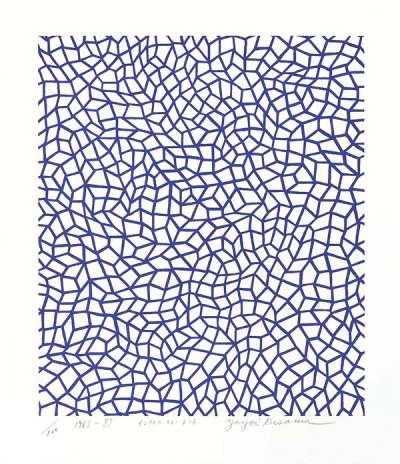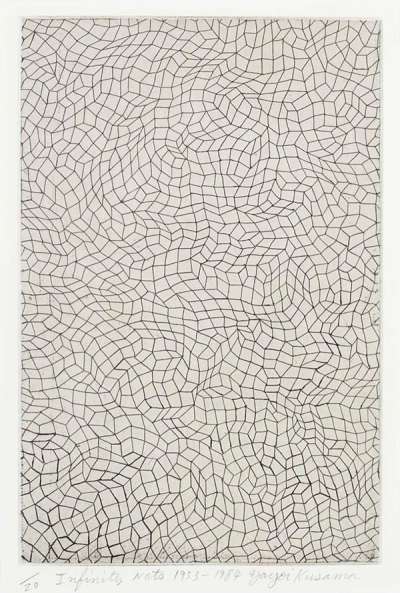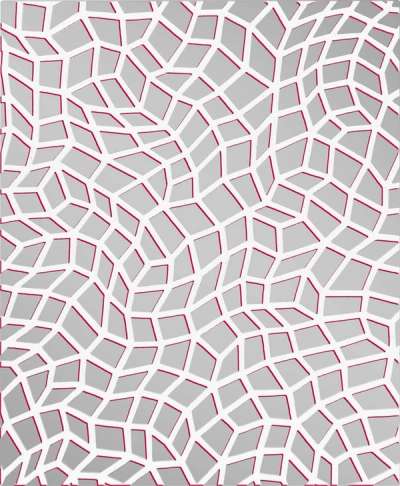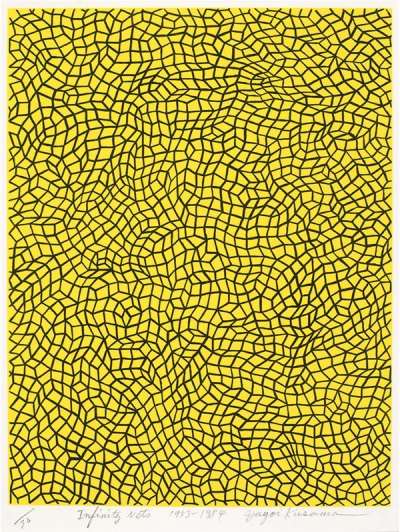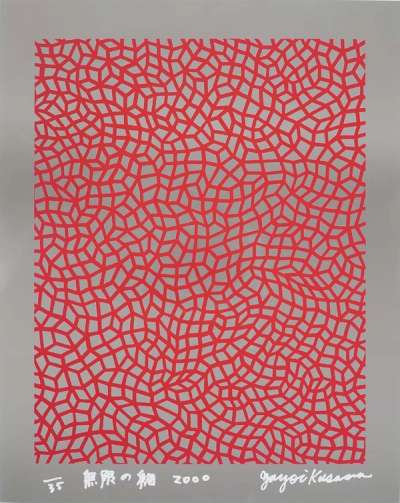 Infinity Nets, Kusama 297 © Yayomi Kusama
Infinity Nets, Kusama 297 © Yayomi Kusama
Yayoi Kusama
290 works
Yayoi Kusama, with her vibrant polka dots and immersive infinity rooms, has long held the world in rapt fascination. Yet, one of her most pivotal and profound series, Infinity Nets, is an understated testament to her genius. First introduced in the late 1950s, these intricate canvases juxtapose obsession with meditation, the personal with the universal. They stand not just as artworks, but as gateways into Kusama's psyche, her experiences with hallucinations, and her quest for cosmic unity. This collection tells a story of resilience, innovation, and the boundless spirit of an artist who seeks to dissolve herself into the vast expanse of the universe. This journey through the intricacies of Kusama's nets invites us to view, immerse, ponder, and lose ourselves within them.
It holds the record for the highest price paid for a living female artist
 Infinity Nets (YOR) © Yayomi Kusama 2004
Infinity Nets (YOR) © Yayomi Kusama 2004The 2022 sale of an Infinity Nets painting at Phillips, fetched over $10 million, marking a pivotal moment for female artists. Historically overshadowed in a male-dominated market, Kusama’s record-breaking auction price marked a turning point in the artist’s career; signaling a growing acknowledgment of female artists' contributions. Beyond its impressive price tag, this sale reinforces Kusama's position within the market, establishing a new benchmark in her career.
The Infinity Net paintings were first exhibited in New York in 1959
 Infinity Nets © Yayomi Kusama 1984
Infinity Nets © Yayomi Kusama 1984The debut of Yayoi Kusama's Infinity Net paintings in New York in 1959 marked a transformative moment in art history. At a time when the city was the epicentre of the Abstract Expressionist movement, dominated by the likes of Pollock and de Kooning, Kusama introduced a fresh, unique visual language. Her meticulous and hypnotic nets contrasted with the wild, gestural brushstrokes of her contemporaries.
Infinity Nets was created in uninterrupted sessions lasting 40 to 50 hours
 Infinity Nets, Kusama 26 © Yayomi Kusama 1983
Infinity Nets, Kusama 26 © Yayomi Kusama 1983Kusama's creation of the Infinity Nets in marathon sessions upwards of 50 hours reveals her dedication and almost meditative immersion into her art. These extended periods of painting, without significant breaks, mirror the endless, continuous nature of the nets themselves. This act of self-obliteration through art reflects Kusama's broader themes of infinity and immersion into the universe.
They were part of a larger avant-garde movement
 Infinity Nets (WR) © Yayomi Kusama 2004
Infinity Nets (WR) © Yayomi Kusama 2004They were part of a larger avant-garde movement: The late 1950s and 60s were a transformative period in art, with artists pushing the boundaries of what was considered mainstream. Kusama's Infinity Nets, with their avant-garde aesthetic, were at the forefront of this shift. While many artists of the period were looking towards grand gestures and large-scale installations, Kusama chose a more introspective route, focusing on the minutiae and the repetitive, effectively setting her apart from her peers and solidifying her legacy in the avant-garde art movement.
The patterns became a coping mechanism for Kusama
 Infinity Nets (YBL) © Yayomi Kusama
Infinity Nets (YBL) © Yayomi KusamaFrom a young age, Kusama experienced unsettling hallucinations of lights, spots, and obliterating patterns. These visions were often overwhelming, blurring the boundaries between the self and the world surrounding her. By repeatedly painting these intricate patterns, Kusama found solace and a way to process her sensory experiences. The act of painting became a focused, ritualistic means of self-regulation. Her repetitive work allowed her to externalise her internal chaos but also transformed it into something universally beautiful and resonant.
Kusama strays away from her polka dots
While Kusama is famously celebrated for her vibrant polka dots — a signature that's adorned everything from paintings to sculptures, Louis Vuitton and even immersive infinity rooms — the Infinity Nets series introduces a different, yet equally mesmerising motif. Where the polka dots symbolise endless continuity and the vast cosmos, the mesh-like patterns in Infinity Nets represent the interconnectedness of life, resembling a vast, unbroken web. By branching out from the expected, Kusama invites her audience to explore her oeuvre more deeply, highlighting that her creations are not just patterns but entire universes she's woven together.
The series continued to evolve in size and colour
 Infinity Nets (B) , Kusama 296 © Yayomi Kusama
Infinity Nets (B) , Kusama 296 © Yayomi KusamaOver the years, Infinity Nets has undergone significant transformation, both in dimensions and colour variations. This evolution is emblematic of Kusama's ceaseless spirit of exploration and her innate ability to adapt. While the foundational pattern remains consistent, the changes in size allow viewers to engage differently. The shifting colour palettes, on the other hand, invoke varied emotions and perceptions, from monochromatic subtleties to bold contrasts. Collectively, these changes point to Kusama's mastery in versatility and pushing boundaries.
The white Infinity Nets paintings are the most sought after
 Infinity Nets, Kusama 297 © Yayomi Kusama 2001
Infinity Nets, Kusama 297 © Yayomi Kusama 2001The white-on-white Infinity Nets paintings are sought after by collectors, and for good reason. Their clean aesthetic, paired with intricate mesh-like patterns, offers a layer of elegance only Kusama can deliver. Conveying both minimalism and detail, these works possess a beautiful duality of simplicity and complexity. In 2014, White No. 28 went under the hammer at Christie's for over $7 million.
Kusama's repetitive technique reflects her desire to be part of the infinite universe
 Infinity Nets, Kusama 76 © Yayomi Kusama 1984
Infinity Nets, Kusama 76 © Yayomi Kusama 1984The Infinity Nets, with their endless, mesmerising patterns, aren't solely visual motifs, but are spiritual quests. Driven by the idea of self-obliteration, the repetitive patterns are Kusama's vehicle to dissolve her ego, striving to blend with the boundless universe. Each interlocking web is a step closer to this cosmic unity. For Kusama, this process is a transcendence, channelling the immense vastness of the universe onto her canvases.
They’ve been featured in world-class museums
 Infinity Nets © Yayomi Kusama 1984
Infinity Nets © Yayomi Kusama 1984Prominent institutions, including the Guggenheim Museum in New York, the Museum of Modern Art, and the Art Institute of Chicago, proudly featured early examples of Kusama's Infinity Nets in their collections. Their inclusion not only underscores their visual and conceptual significance but also highlights Kusama's groundbreaking role in bridging together Eastern and Western art. Naturally, these acquisitions have played an imperative role in influencing private collectors, enhancing the desirability and value of Kusama's works in the global art market.


